Several of President-elect Donald Trump’s cabinet nominees are under intense scrutiny following serious accusations of misconduct, ethics violations, and controversial public statements.
These challenges have raised significant concerns about their fitness for high-level government roles, setting the stage for a contentious confirmation process in the US Senate.
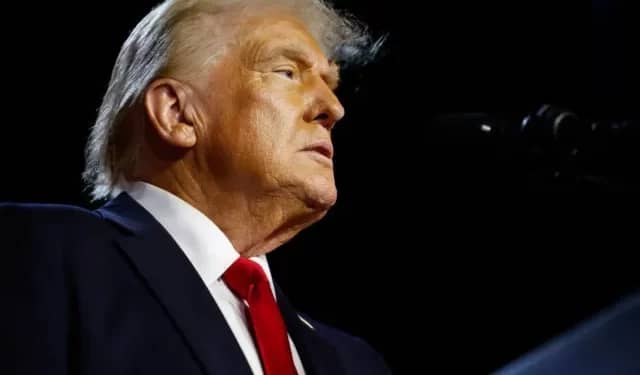
Pete Hegseth – Defence Secretary Nominee
Trump’s nominee for Defence Secretary, Pete Hegseth, has come under fire after police revealed he had been investigated for a sexual assault allegation dating back to 2017.
Hegseth, a veteran of the Afghanistan and Iraq wars and a former Fox News host, has denied the accusations, asserting that he was never arrested and no charges were filed.
In addition to the assault allegation, Hegseth has faced criticism for a controversial tattoo. The “Deus Vult” symbol, which he has inked on his arm, is a Latin phrase historically associated with the Christian crusaders and has raised concerns due to its links to white-supremacist and extremist groups.
Although Hegseth has denied any association with extremist organizations, his tattoo was flagged as a potential “insider threat” by military personnel. Hegseth has fiercely defended the tattoo, calling it a symbol of his Christian faith, and accused critics of engaging in anti-Christian bigotry.
Despite the controversy, Hegseth’s supporters, including US Vice-President-elect JD Vance, have rushed to his defense, arguing that the symbol is misinterpreted and that Hegseth has no ties to any hate groups.
However, these allegations could complicate Hegseth’s confirmation in the Senate, where both Republican and Democratic lawmakers are likely to question him on these issues.
Matt Gaetz – Attorney General Nominee
Matt Gaetz, nominated for Attorney General, is facing serious allegations of sexual misconduct, illicit drug use, and misuse of campaign funds during his time as a congressman.
The 42-year-old Florida Republican resigned from his seat in the House of Representatives just hours after Trump nominated him, halting the release of a congressional ethics report into the accusations.
The allegations, including claims that Gaetz had sex with a 17-year-old while he was an adult, have been the subject of a prolonged investigation by the US Justice Department, which ultimately declined to bring charges against him.
Despite this, the allegations continue to linger, and lawmakers are pushing for the release of the House Ethics Committee’s report, which includes testimony from women who allege Gaetz was involved in sexual misconduct.
Gaetz has denied all allegations, asserting that “lies were weaponized” against him in an effort to destroy his political career. The controversy surrounding his nomination raises serious concerns about his ability to serve as the nation’s top prosecutor, especially as the Justice Department has already investigated the claims and decided not to move forward with charges.
Robert F. Kennedy Jr. – Health and Human Services Secretary Nominee
Trump’s nomination of Robert F. Kennedy Jr. to head the Department of Health and Human Services (HHS) has sparked intense backlash, especially from public health officials and medical professionals.
Kennedy, a long-time vaccine sceptic, has been a vocal critic of “Big Pharma” and vaccine mandates, which has drawn sharp criticism from health experts who fear that his views could undermine years of progress in public health.
Kennedy’s stance on vaccines has already caused widespread concern, with public health organizations arguing that his scepticism has contributed to a rise in vaccine hesitancy and posed risks to public health.
The head of the American Public Health Association (APHA), Dr. George C. Benjamin, called Kennedy “absolutely the wrong guy” for the job, citing his harmful influence on immunization efforts.
On the economic front, Kennedy’s views have led to a significant drop in the stock prices of major vaccine manufacturers and health-related companies, as investors worry about his potential influence on government policy.
His nomination is also raising alarm among those in the medical community who view him as a dangerous choice to lead HHS, a department tasked with overseeing critical healthcare initiatives.
These cabinet nominees will face intense scrutiny during the Senate confirmation hearings, set to take place after Trump assumes office in January.
While the Senate will be controlled by Republicans, the controversial nature of these nominees’ backgrounds is expected to lead to a fiercely contested confirmation process.
Democrats and some Republicans have already signaled their intention to challenge Trump’s picks, particularly as their controversial pasts are examined.
Trump has yet to publicly comment on the mounting criticisms of his cabinet picks, although the outcome of the confirmation hearings will significantly impact his administration’s ability to govern effectively.
Other key positions, including FBI director and Treasury Secretary, remain unfilled, with the president-elect continuing to assemble his team ahead of his inauguration.
As the confirmation process moves forward, it remains to be seen whether these nominees will overcome their controversies and secure the necessary support to take up their posts.
The battle over these high-profile positions will likely shape the direction of Trump’s administration and have far-reaching implications for US policy.
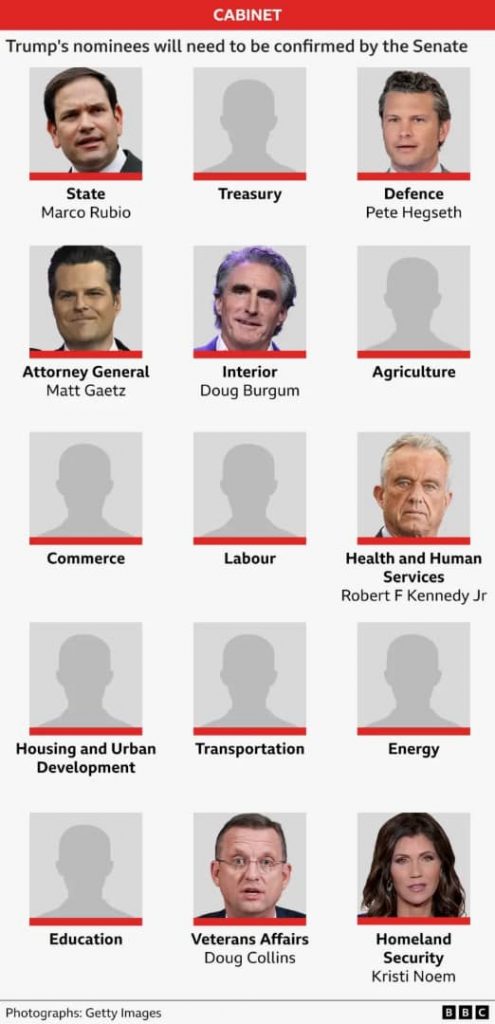
































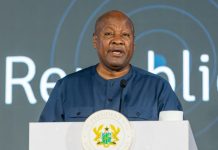


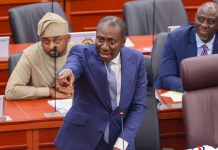

















![[FREE FREE MONEY] Predict and Win a Guaranteed GH¢200 From Us EVERY WEEK](https://wordpress.ghanatalksradio.com/wp-content/uploads/2022/02/Predict-and-Win-Final-09-03-2021-218x150.jpg)
![[Predict & Win – 8th/Oct.] WIN A Guaranteed ¢200 From Us This Week](https://wordpress.ghanatalksradio.com/wp-content/uploads/2021/10/maxresdefault-16-218x150.jpg)
![[Predict & Win – 2nd] WIN A Guaranteed ¢200 From Us This Week](https://wordpress.ghanatalksradio.com/wp-content/uploads/2021/09/maxresdefault-50-218x150.jpg)
![[Predict & Win – 25th] WIN A Guaranteed ¢200 From Us This Week](https://wordpress.ghanatalksradio.com/wp-content/uploads/2021/09/maxresdefault-36-218x150.jpg)
![[Predict & Win – 18th] WIN A Guaranteed ¢200 From Us This Week](https://wordpress.ghanatalksradio.com/wp-content/uploads/2021/09/maxresdefault-23-218x150.jpg)



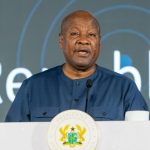






![[National cathedral] See full list of churches that have contributed since 2018](https://wordpress.ghanatalksradio.com/wp-content/uploads/2020/09/Ghana-National-Cathedral-GhanaTalksRadio-100x70.jpg)



